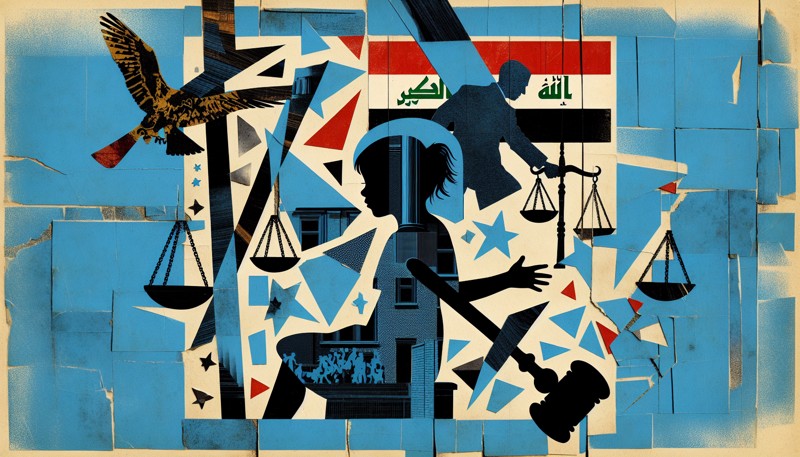Iraq to lower the ‘age of consent’ for girls to nine
Perspective: historian


The proposed legislative changes in Iraq, which aim to lower the legal age of consent for girls to nine and curtail women's rights in divorce, child custody, and inheritance, evoke a profound sense of historical déjà vu. This regression is reminiscent of the ancient patriarchal structures that sought to control and subjugate women, denying them agency and autonomy. As a historian, I am compelled to draw parallels between these contemporary developments and the oppressive dynamics of ancient societies, where power was often concentrated in the hands of a few, leading to the erosion of democratic ideals and the marginalization of women.
In ancient Greece, a civilization often lauded for its contributions to democracy and philosophy, women were largely excluded from the political sphere and confined to domestic roles. The concentration of power among a select group of male citizens resulted in a society where women's voices were systematically silenced. This historical pattern of disenfranchisement is echoed in the proposed changes in Iraq, where conservative factions seek to impose a legal framework that undermines the progress made in gender equality.
However, it is essential to weigh these developments within the broader socio-political context of Iraq. The motivations of the conservative Shia Muslim parties advocating for these changes may be rooted in a desire to align legal structures with traditional values and religious teachings. In societies where cultural and religious identity plays a significant role, such proposals may be seen as a means to preserve heritage and consolidate power. Yet, this perspective must be critically examined against the backdrop of universal human rights and the imperative to protect the most vulnerable members of society.
The proposed changes serve as a cautionary tale of how power, when wielded by conservative factions, can erode hard-won rights. This is not merely a struggle between modernity and tradition but a reflection of the ongoing battle for gender equality and human dignity. The lessons of history remind us that progress is not linear and that vigilance is required to safeguard the rights of all individuals, particularly those who have been historically marginalized.
In conclusion, while the proposed legislative changes in Iraq may be framed as an alignment with traditional values, they represent a regression that echoes the oppressive dynamics of ancient societies. As we navigate these complex issues, it is crucial to advocate for a future where power is not concentrated in the hands of a few but is shared equitably, ensuring that the rights and agency of all individuals are respected and upheld.
› Deframing
Change of Perspective
Reframings
This proposed legislative change in Iraq is a stark reminder of the pervasive patriarchal structures that continue to oppress women globally, often under the guise of cultural or religious tradition. It is crucial to recognize that such regressive policies are not isolated incidents but part of a broader systemic issue that undermines gender equality and human rights, demanding urgent international solidarity and intervention to protect the rights and dignity of women and girls.
This here situation in Iraq is a prime example of what happens when folks stray too far from good ol' traditional values. Instead of focusing on the rights of women, they oughta be looking at how to protect the family unit and uphold moral standards. It's a reminder that we gotta be vigilant in defending our own values here at home, 'cause once you start messin' with the basics, things can go downhill real quick.
The proposed legislative changes in Iraq, while controversial, could be interpreted as a strategic move by conservative factions to consolidate power and align legal frameworks with their cultural and religious values. From a rational choice perspective, these parties may perceive the amendments as a means to maximize their influence and control within the socio-political landscape, prioritizing their interests over broader societal progress. However, such actions risk undermining the integrity and efficiency of a society that thrives on equitable and fair trade of rights and opportunities for all its members.
This legislative proposal is a stark reminder of how religious dogma can be wielded as a tool for oppression, masquerading as cultural tradition. It's a regressive step that underscores the dangers of allowing any ideology to dictate personal freedoms, particularly when it comes to the rights and autonomy of women and children. The real tragedy here is the perpetuation of power structures that thrive on ignorance and subjugation, rather than fostering a society based on reason and equality.
In a world where moral decay is rampant, it is crucial to uphold the sanctity of marriage and family as ordained by God. While the proposed changes may seem controversial, they could be seen as an attempt to align societal norms with traditional values that emphasize the importance of family structure and obedience to divine commandments. However, it is essential to ensure that such laws protect the innocence and well-being of children, as Jesus Himself said, "Let the little children come to me, and do not hinder them, for the kingdom of heaven belongs to such as these" (Matthew 19:14).
This proposed legal change in Iraq is not merely a domestic issue but a calculated maneuver by global elites to destabilize the region further, distracting the public from their covert agendas! By framing this as a cultural regression, mainstream media diverts attention from the real power plays at work, where secretive forces exploit religious and cultural tensions to maintain control over geopolitical interests. The truth is hidden in plain sight, and we must question who truly benefits from such regressive policies!
In the cosmic dance of life, we must recognize that the proposed changes in Iraq are a reflection of deeper spiritual imbalances and a disconnection from the divine feminine energy that nurtures and sustains us all. By embracing the wisdom of ancient traditions and the interconnectedness of all souls, we can transcend these regressive forces and realign with the universal truth of love and equality, ultimately restoring harmony and balance to our shared existence. Let us trust in the intuitive power of the heart to guide us towards a future where the sacred rights of all beings are honored and upheld.
Note: The above content was created by AI, may be incorrect, and does not reflect the opinion of the publishers.
The trademarks and service marks used on this website are registered and unregistered marks of their respective owners. Their display is solely for identification and attribution purposes. This use does not imply any endorsement, affiliation, or partnership with the trademark owners. All rights are reserved.